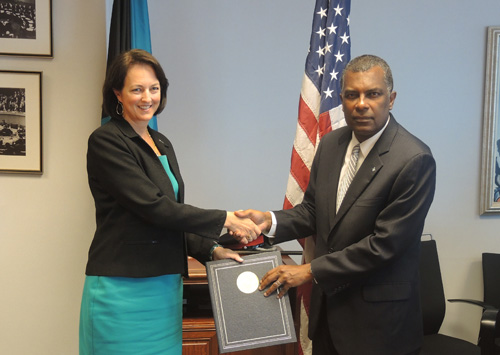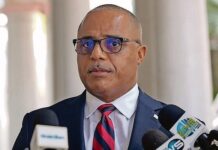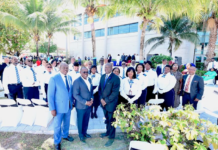
Nassau, New Providence – Signaling to the world its unwavering commitment to bilateral cooperation in protecting their borders from the threats of money laundering, human trafficking and the smuggling of illicit drugs and firearms, The Bahamas and the United States signed an agreement that is the 7th amendment to the letter on counter-narcotics control and law enforcement. The signing ceremony was held on Monday, 27th April 2015 at the Ministry of Foreign Affairs.
Reiterating the significance of this agreement was Bahamas Foreign Affairs Minister, Hon. Fred Mitchell.
“The significance of this Agreement is irrefutable. The Bahamas Government recognizes that the protection of our borders from the pernicious threats of money laundering, human trafficking and the smuggling of illicit drugs and firearms, requires a concerted effort and welcomes the assistance of its closest neighbor.”
At $2.745 million, this is the largest of all of the financial allocations connected with these amended agreements and will assist greatly in “buttressing The Bahamas’ national security efforts in law enforcement, counter-narcotics control, drug demand reduction and anti-corruption reform” that are all “critical in countering this incessant and increasingly menacing threat” said Mitchell. He referred to these illegal activities generally as a “black market.”
The Minister added that if this illegal black market is allowed to continue unchecked, it will eventually undercut and destroy the principles of meritocracy and undermine the “substratum of the rule of law” which will have a debilitating effect on society.
Quantifying the success of this agreement which is essentially a critical component of the Caribbean Basin Security Initiative, Minister Mitchell pointed to the hugely successful Operations Bahamas Turks and Caicos, or OPBAT.
Commenting on future collaborative initiatives between the two nations, Minister Mitchell foreshadowed a Memorandum of Understanding (MOU) between the Bahamas and the United States designed to facilitate greater intelligence information sharing on critical transnational matters such as migrant smuggling and human trafficking to get greater control over this increasingly complicated area of border protection.
“Increasingly the assets of the United States government – those assets in The Bahamas – have been used to fight migrant smuggling and this is becoming an ever more complicated area and right now for example we are trying to – we are working on an exchange of dip (diplomatic) notes which will in effect be a Memorandum of Understanding between the two countries on the sharing of intelligence information coming out of interdiction of migrants on the seas. So the idea would be that if the Royal Bahamas Defense Force and the Department of Immigration interdict migrants who are trying to come into The Bahamas, that we would ask them certain questions, collect certain information and that information is then shared with the United States which has a lot of assets around to deal with it because they can move the assets and help try and interdict others who are coming” said Mitchell.
Mitchell also revealed that in celebrating this continued collaborative commitment to countering transnational crime, the Bahamas looks forward to hosting the US-Caribbean Security Summit in the coming weeks which will bring together regional experts in the pursuit of combating organized crime plaguing the region.







